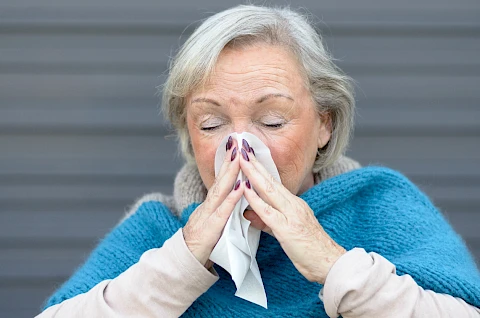
Seasonal allergies can be a real challenge for seniors, especially in the fall when allergens like ragweed pollen and mold spores become prevalent. Allergies can exacerbate existing health conditions, making breathing, sleeping, and enjoying daily activities difficult. With some proactive steps and strategies, you can help senior loved ones navigate the colder months more comfortably.
Common Allergy Symptoms in Seniors
Recognizing allergy symptoms in seniors is the first step in managing them effectively. Here are some common symptoms to watch out for:
- Sneezing and Runny Nose: These are often the most noticeable signs of allergies.
- Itchy or Watery Eyes: Allergies can cause irritation and discomfort in the eyes.
- Coughing and Wheezing: These symptoms can be mistaken for other respiratory issues, but it's wise to consider allergies as a possible cause.
- Fatigue: Allergies can lead to increased tiredness and reduced energy levels.
- Headaches: Persistent headaches may occur due to sinus pressure or congestion caused by allergies.
Strategies for Minimizing Allergen Exposure
Seniors may be more sensitive to allergens due to age-related changes in the immune system or pre-existing health conditions. Reducing exposure to allergens is paramount to managing seasonal allergies.
Keep windows closed and use air conditioning to prevent pollen and other allergens from entering the home. Regularly clean and vacuum living spaces, as dust and pollen can accumulate quickly. Air purifiers with HEPA filters can effectively remove allergens from the air, making breathing easier.
Avoid outdoor activities during high pollen counts. Check the daily pollen forecast online and remain indoors when levels are elevated. Wearing masks and sunglasses outdoors can also filter out allergens and protect the eyes from pollen.
Working With Healthcare Providers
Collaborating with healthcare providers when managing seasonal allergies in seniors ensures that they receive the most appropriate care tailored to their specific needs. Here's how you can work with them effectively:
- Discuss All Medications: There are various medications available that can manage symptoms. You should discuss these options and any current medications your senior loved one takes with their healthcare provider to find the best fit.
- Consider Allergy Testing and Immunotherapy: Allergy tests can identify specific allergens, and immunotherapy can build resistance to them over time.
- Monitor and Adjust Treatment Plans: Allergies can change. Regularly reviewing and adjusting treatment plans with the senior’s healthcare provider ensures the management approach remains effective.
- Keep an Updated List of Medications and Allergies: This ensures that all healthcare providers have accurate information to provide the senior with the best care.
Working closely with healthcare providers ensures you can develop a comprehensive plan to manage seasonal allergies in senior loved ones effectively.
Manage Seasonal Allergies With the Assistance of Senior Helpers
Managing seasonal allergies in seniors is pivotal for their comfort and well-being, particularly in the colder months. If you need additional support caring for a senior loved one at home, including medication reminders, transportation to and from doctor appointments, and other facets of senior care, Senior Helpers Rhode Island can help. We provide non-medical in-home care solutions to seniors in Coventry, Warwick, Pawtucket, Providence, and Woonsocket. Contact us to learn more about how we can help!